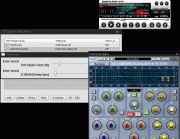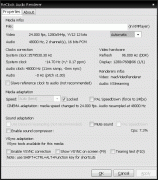slim.a
1000+ Head-Fier
- Joined
- Jan 8, 2009
- Posts
- 1,228
- Likes
- 24
Quote:
Hi jumping,
Thanks for your impressions! Glad to see you have finally achieved a pleasing sound from your computer.
As for the harshness you have noticed with the PS Audio Digital Link 3, it doesn't necessarily come from the upsampling but in my opinion, it rather comes from the technology used in the DAC. The PS Audio Digital Link 3 uses a sigma-delta dac chip which are known to be harsh sounding compared to the R2R/multibit DACs. To not digress again, I will suggest reading this interesting article : Mother of Tone - Conversion Techniques
By the way, while I used to think that the low jitter hiface could be a good solution for every application, I came to realize that in some cases, using a slightly more jittery interface (such as the Teralink-x) can provide better subjective results whith DACs that are not neutral.
When I was reviewing the Purepiper DAC A-1 (which uses a sigma delta CS4398), the most "pleasing" sound to the ears was not achieved through the Hiface but through the warmer sounding devices (Teralink-X and Purepiper own usb to spdif converter).
I think that by lowering the jitter too much, we start hearing other types of distortions (that were previously masked by jitter).
Of course, not all "jittery" interfaces are pleasing to the ears. For example, the EMU 0404 (when used as usb to spdif converter) is less detailed than other converters and is more edgy at the same time.
Overall, from my own experience (and what I read about different units), it appears safe to say that the Teralink-X is a relatively detailed converter but slightly on the warm side while the Hiface is more detailed device but rather on the neutral side.
If you are planning to upgrade your DAC and want to improve both details and naturalness of the sound, I suggest looking towards some R2R/multibit based DACs (that use the PCM1704 chip for example).
| Originally Posted by jumping /img/forum/go_quote.gif Just a brief digression back to the original topic. I really appreciate your honest review of the USB to SPDIF converters that started this thread. I have a huge collection of cd's ripped to flac files on computer hard drives and have been trying for years to find a way to play them on audiophile equipment. The best of those cd's sound great on just about anything, but most have a very definite edgy quality played thru even the best of DAC's. The Terralink-X did just what you said it would and allows me to enjoy a huge collection of cd's played thru a usb hub linked to a PS Audio Digital Link 3 with level 3 Cullen mods. The harshness in the upper registers that has plagued me for the last 3 years with several decent DAC's is completely gone. I am not entirely sure why, since the PS Audio DAC upsamples everything to 192, but the combination of the Terralink-X thru an RCA coax link to my DAC sounds terrific on even my old cd's. By the way, the RCA coax is audibly better than the optical link. Makes me want to try the new PS Audio Perfect Wave DAC in the native mode. (When I next have a few grand to drop on their system 
|
Hi jumping,
Thanks for your impressions! Glad to see you have finally achieved a pleasing sound from your computer.
As for the harshness you have noticed with the PS Audio Digital Link 3, it doesn't necessarily come from the upsampling but in my opinion, it rather comes from the technology used in the DAC. The PS Audio Digital Link 3 uses a sigma-delta dac chip which are known to be harsh sounding compared to the R2R/multibit DACs. To not digress again, I will suggest reading this interesting article : Mother of Tone - Conversion Techniques
By the way, while I used to think that the low jitter hiface could be a good solution for every application, I came to realize that in some cases, using a slightly more jittery interface (such as the Teralink-x) can provide better subjective results whith DACs that are not neutral.
When I was reviewing the Purepiper DAC A-1 (which uses a sigma delta CS4398), the most "pleasing" sound to the ears was not achieved through the Hiface but through the warmer sounding devices (Teralink-X and Purepiper own usb to spdif converter).
I think that by lowering the jitter too much, we start hearing other types of distortions (that were previously masked by jitter).
Of course, not all "jittery" interfaces are pleasing to the ears. For example, the EMU 0404 (when used as usb to spdif converter) is less detailed than other converters and is more edgy at the same time.
Overall, from my own experience (and what I read about different units), it appears safe to say that the Teralink-X is a relatively detailed converter but slightly on the warm side while the Hiface is more detailed device but rather on the neutral side.
If you are planning to upgrade your DAC and want to improve both details and naturalness of the sound, I suggest looking towards some R2R/multibit based DACs (that use the PCM1704 chip for example).































